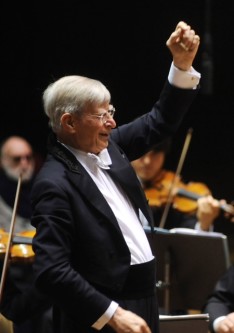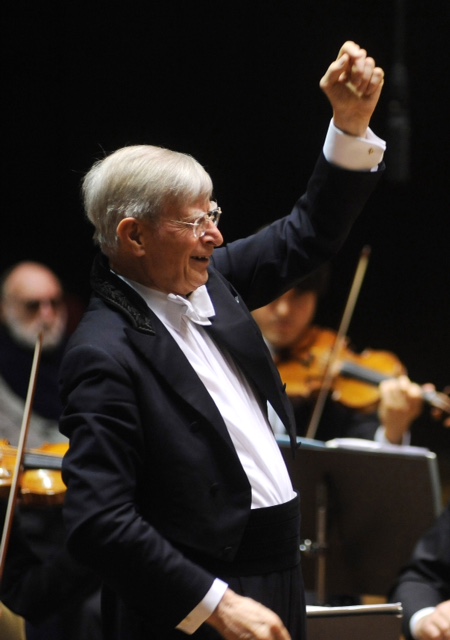 Switzerland Grieg, Lidholm & Dvořák: Tonhalle Orchestra Zurich, Herbert Blomstedt (conductor), Tonhalle Zurich, 28.1.16. (JR)
Switzerland Grieg, Lidholm & Dvořák: Tonhalle Orchestra Zurich, Herbert Blomstedt (conductor), Tonhalle Zurich, 28.1.16. (JR)

Grieg, Peer Gynt Suite
Lidholm, “Poesis”
Dvořák, Symphony No. 9
Apparently when the Orchestra Manager asked Blomstedt, 88, whether he wanted a chair for rehearsals, he declined, adding such things were for old men. I take my hat off to him: he seems to be immortal. He looks fit as a fiddle and conducted more vigorously than many of his younger counterparts.
The concert began with Grieg’s playful Peer Gynt Suite. As Blomstedt himself pointed out to the audience, Grieg wrote no symphonies but was a master at very short pieces. When Blomstedt conducts, you can see and feel it’s music he loves, as he nurtures each inflection and nuance. He smiles benevolently throughout. The first piece “Morgenstimmung” was most tenderly rendered, “Ases Death” was atmospheric, smiles all round for “Anitra’s Dance” and some grotesque woodwind sounds introducing “In the Hall of the Mountain King” which Blomstedt whipped up into a ferocious frenzy. It all made for a highly entertaining, tuneful start.
Swedish composer Ingvar Lidholm was born in 1921 and composed “Poesis” in 1963 on a commission from the Royal Stockholm Philharmonic Orchestra to celebrate its fiftieth anniversary the following year. Herbert Blomstedt led that ensemble. In a new edition of the piece in 2011, the composer dedicates “Poesis” to Herbert Blomstedt—“a great conductor and a wonderful friend.” While the stage was being re-arranged for the piece, Blomstedt picked up a microphone and gave us a 20 minute talk on the work’s composer and the composition. He explained (in faultless German) that the piece has no melodies, no harmony, no rhythm – it’s rather a series of noises or sounds than music. It is scored for four flutes (all four doubling piccolo), four oboes, four clarinets, four horns, four trumpets, four trombones, tuba, four percussion players (bongos, reco-reco, claves, tambour de basque, marimba, snare drum, small cymbal and gong, cowbells, tenor drum, medium cymbal and gong, sand block, whip, timbales, large cymbal and gong, temple blocks), piano, and strings: that gives you the picture. The 20-minute long piece starts with a percussionist rubbing sandpaper; Blomstedt told us it needs to be sandpaper grade 60 to get the right effect. The strings glide up and down the strings and there is a solo for the double bass principal. The story goes that the principal of the Stockholm Philharmonic, when the piece was premièred, disliked modern music, so rather cheekily Lidholm wrote a solo for him – after which, so it is claimed, he became converted.
Half-way through the piece there is an extended cadenza for the solo pianist, in this performance Gilles Grimaître, employing a number of theatrical gestures such as rubbing the strings roughly inside the instrument (he needs gloves for this) and putting his arm on the keyboard. The piece ends with a very loud and sudden climax – it is interesting cacophony, fun “music theatre” and was very well received. Full marks go to the orchestra’s accomplished marimba player, Klaus Schwärzler.
The second half of the concert was devoted to “The New World Symphony”, music that we all know well. Blomstedt managed to get us to listen to it afresh; it was truly exhilarating. Dvořák of course was a master of melody and Blomstedt allowed us to wallow; I have not heard the orchestra play better for a while with playing of precision and finesse. The opening Allegro was playful, the cor anglais soloist did a fine job in the Adagio, which was not too sentimental; there was plenty of rhythmic bounce and highlighted trilling to savour in the third movement and, to finish, an energetic and rousing Finale.
A wonderful concert: the orchestra stamped their feet in appreciation of Blomstedt. No doubt the orchestra’s management will be planning a return visit next season – long may he continue in such evident good health!
John Rhodes
